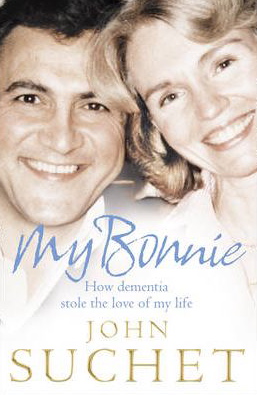Library
A courageous book about love blighted by disease
JOHN SUCHET - My Bonnie: How Dementia Stole the Love of My Life - HarperCollins - 2010
 This is a courageous book. It certainly took courage to write it, and some may find that it takes courage to read it. In a tragic story of love blighted by disease, John Suchet tells how he lost his beloved wife not to death, but to dementia. It is a harrowing loss, but the story is made bearable by the author’s compassion, humour and vivid memories of the good times in an exceptionally happy marriage lasting over two decades.
This is a courageous book. It certainly took courage to write it, and some may find that it takes courage to read it. In a tragic story of love blighted by disease, John Suchet tells how he lost his beloved wife not to death, but to dementia. It is a harrowing loss, but the story is made bearable by the author’s compassion, humour and vivid memories of the good times in an exceptionally happy marriage lasting over two decades.
The book opens with a poignant description of the first hint of Bonnie’s illness, a momentary loss of memory while she and John are waiting to board a plane at Stansted Airport in 2004. She is briefly lost, re-appears and says, “I don’t understand.” John is puzzled by the odd remark, but quickly forgets the incident as they start a holiday in France. “I shouldn’t have,” he says. “It was the beginning.” He goes on to describe how dementia gradually undermines Bonnie, destroying her memory, her mind and any meaningful relationship with him or the outside world. Finally he is obliged to put her in a care home. A grim story, but relieved by bright flashbacks to their life together. It all started when John fell hopelessly for the beautiful blonde American girl - “think Grace Kelly in High Society…” - who came to live nearby in Henley-on-Thames. It seemed an impossible dream: both were married at the time, with children: John had three sons, Bonnie two. Later, after both their marriages had broken down, they got together when John was ITN correspondent in Washington. Then they married and lived happily, not ever after, but for more than 20 years, until dementia struck.
John recounts this personal drama against the often dramatic background of his professional life. His journalistic career began with Reuters. He joined the news organisation as a graduate trainee, straight from Dundee University. He got the job, he says, thanks to a certain ease in writing a news story and a shameless exaggeration of his linguistic skills, which were not tested at interview. “The start to my Reuters career was stellar,” he writes. Within eight months of joining he was on the streets of Paris, covering the 1968 riots against President de Gaulle. He was then offered a “startling promotion”, a posting to Congo Brazzaville - but turned it down at the insistence of his first wife, who wanted to remain in the UK. Realising he had made “the first major mistake of my fledgling journalistic career”, he resigned from Reuters and got a junior job with BBC television news, writing the weather forecasts and football news. “I managed to do even that quite badly,” he recalls. After a year and a half he moved to ITN, where he carved out what became a truly stellar career: from television news reporter to one of the nation’s most popular news presenters, culminating in a Lifetime Achievement Award in 2008.
Back to Bonnie. Why did John decide to go public about his wife’s condition? He admits to bouts of doubt and guilt, but has been comforted by overwhelming support from friends and strangers. One of the reasons for writing the book, he has said in interviews, was to shed light on a disease which is widespread but not well understood. He wants to lift the taboo on dementia. He also wants to draw attention to the shocking shortage of specialist nurses (only 60 in the UK for 700,000 dementia sufferers). In the book, John describes how he was helped and supported by staff from an organisation called Admiral Nurses.
All excellent reasons, but perhaps not the main motivation for writing this memoir. Above all, the book is a love story by a self-confessed romantic. A moving tribute, simple but complex, from John to Bonnie, the love of his life.
■
- « Previous
- Next »
- 17 of 22